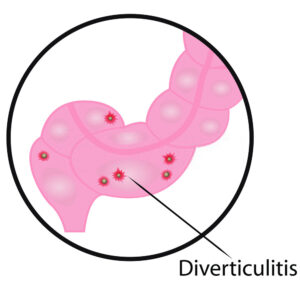One typical gastrointestinal problem that affects adults as they age is diverticulosis. This is when pouches improve within the lining of the colon, or large intestines. These pouches are known as diverticula, and usually, people won’t undergo any symptoms; however, when these pouches become inflamed or infected this leads to diverticulitis, a painful condition that can start to vomiting, bloating, bowel changes, fever, blood in the stool and inside pain. If you have symptoms of diverticulitis it’s important to see your gastroenterologist for an evaluation as soon as possible.

Causes of Diverticulitis
While the cause of diverticulitis isn’t cleared certain factors could improve your possibilities of growing this GI difficulty. People who don’t eat sufficient fiber are more likely to deal with constipation, which can put pressure on the bowels and eventually lead to the development of diverticula within the intestines.
Other factors that could improve your chances for diverticulitis include:
Smoking
Genetics
Age
Being overweight or obese
Leading a sedentary lifestyle
Having more disease-producing bacteria within the colon
Taking steroids or NSAID pain relievers (e.g. ibuprofen)
Seeing a Gastroenterologist
When you come into the hospital for a checkup your GI doctor will ask you questions about the symptoms you are experiencing, your current health, lifestyle, and diet. From there, your Gastroenterologist will determine which type of testing to perform.
Tests to diagnose diverticulitis include:
Barium enema
Flexible sigmoidoscopy
Treating Diverticulitis
Leading a healthy lifestyle can go a long way to decreasing your risk of producing diverticulitis. This condition can often be treated with easy lifestyle adjustments (particularly changes to a patient’s diet) such as:
Improving fiber intake
Taking fiber supplements
Changing certain medications
Taking probiotics
A fluid diet and rest are normally the best ways to ease diverticulitis symptoms. If there is a bleed within the intestines you may require to be hospitalized. Only in difficult cases is surgery needed to eliminate the diseased pouches. With proper care, diverticulosis symptoms may go away within a few days. While developing fiber consumption won’t improve the diverticula that are present it can prevent new pouches from developing.
Wondering if your digestive problems may be due to diverticulitis? If you have unexplained abdomen difficulties it’s time to turn to your gastroenterologist Dr. Sachin Palnitkar for a proper diagnosis.
